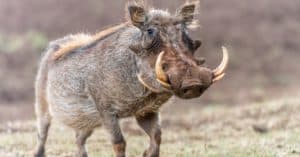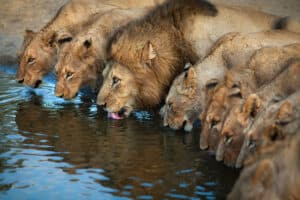Caribou and moose are two very large creatures that belong to the Cervidae family. Although they might look similar at first glance, the two mammals are very distinct if you take a closer look at them. That is exactly what we’re going to do. By the time you’re done reading, you’ll know the major differences between a caribou vs moose.
Before we continue, we have to clear up a matter of nomenclature. Some subspecies of caribou are referred to as reindeer, but there are some differences between these creatures. Most often, you’ll find that people refer to caribou as the animals living in the northern part of the western hemisphere while reindeer are similar subspecies from Eurasia.
Some subspecies are significantly different, but the etymology is not all that important when discussing general differences between the animals. With that out of the way, let’s take a look at these animals’ differences.
Comparing a Caribou and a Moose
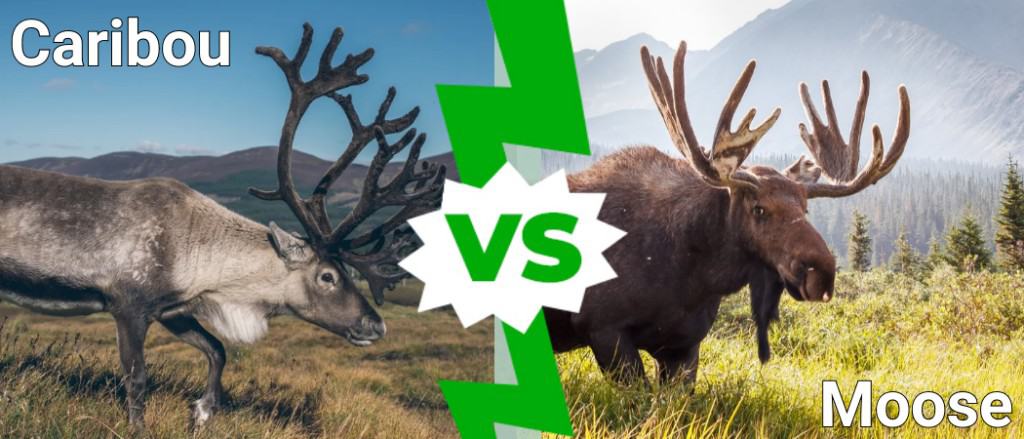
| Caribou | Moose | |
| Size | Weight: 180lbs-700lbs Height: 2.5ft-4.9ft Length: 5.2ft-7ft | Weight: 600lbs-1,500lbs or more Height: 4.6ft-6.9ft at shoulder Length 7ft-10ft |
| Antlers | -Large, tall, branching antlers – Both males and females have antlers | – Large, flat, wide antlers – Only males have antlers |
| Morphology | – Short, bushy tail – Small shoulder hump | – Very small, short tail – Large shoulder hump when fully grown |
| Color | Dark gray, white, brown | Typically, dark brown with gray in their fur as they age |
| Location | – Alaska, northern Canada, Russia, and Scandinavia including Greenland – Arctic tundra, boreal forests mountain tundra – Known for their long migrations that can last 3,000 miles | – Northern part of the United States, Alaska, Canada, Europe, and Asia – Boreal forests and Arctic Tundra, but they do not range as far north as caribou |
| Danger to humans | Rarely aggressive towards humans | – Are known to be aggressive and territorial when its young are involved – Are involved with many car accidents each year |
The Key Differences Between Caribou vs Moose
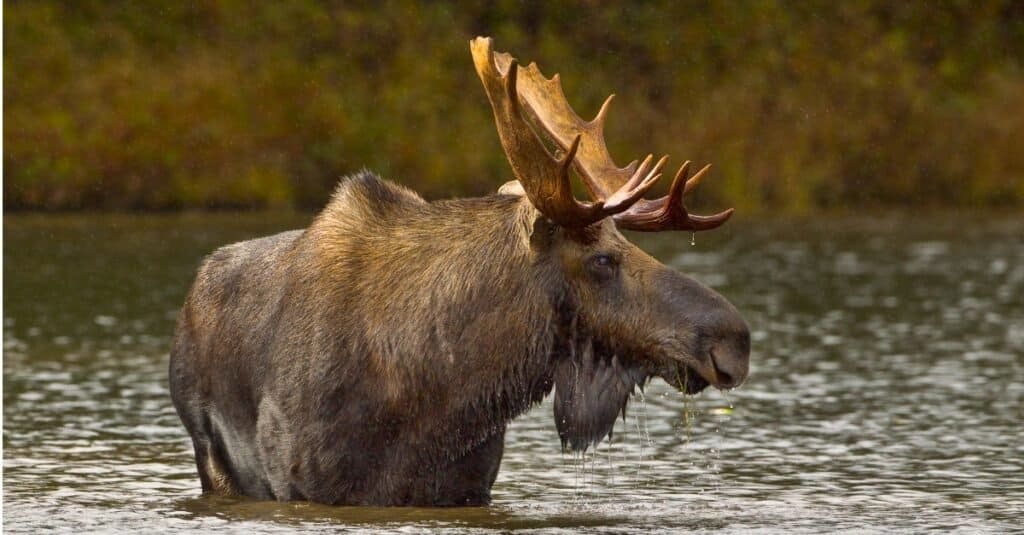
Moose are known for their large size, massive antlers and somewhat uniform color
©iStock.com/RichardSeeley
The greatest differences between caribou and moose are their size, antlers, and general morphology. Moose are a lot bigger than caribou, capable of reaching double their weight and more. Also, moose are taller and longer than caribou.
Moose antlers are large, flat, and wide but caribou have large, tall, branching antlers that are similar in many respects to deer. Caribou and moose antlers are very easy to distinguish.
Caribou have a longer tail and a smaller shoulder hump than moose. While useful, that data needs to be examined in light of other pieces of data to identify the creatures. All in all, these major differences are crucial pieces of information to distinguish caribou and moose.
Caribou vs Moose: Size
Moose are larger than caribou by quite a fair amount. The average caribou will range between 180lbs and 700lbs, stand up to 4.9ft tall, and grow 7ft long. They’re large mammals, but moose are a lot larger. Moose can grow upwards of 1,500lbs, stand 6.9ft at the shoulder, and measure 10ft long when they are fully grown.
Some of the largest moose on record have exceeded all those measurements. Thus, if you put these two creatures side by side, the chances are good that the larger one is going to be a moose.
Caribou vs Moose: Antlers
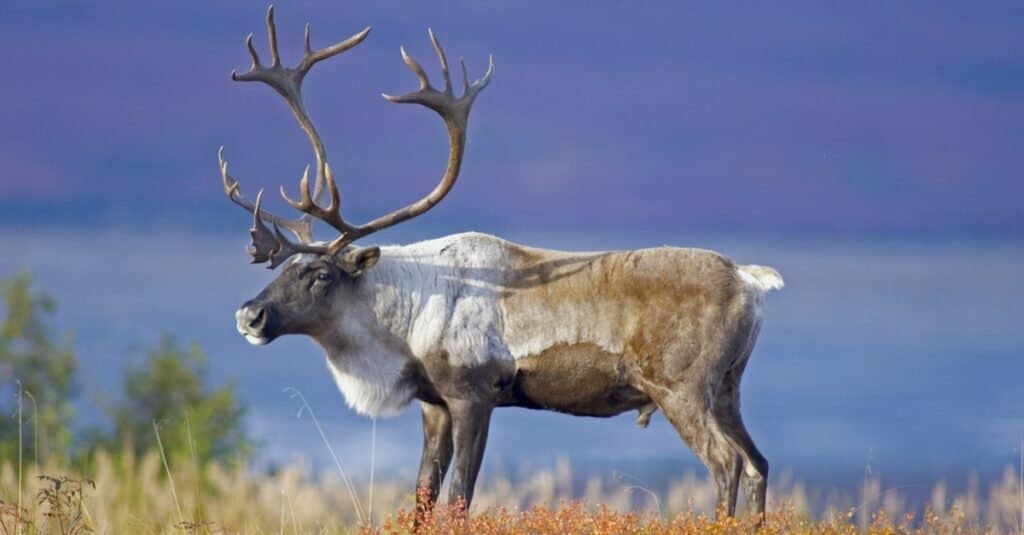
Caribou antlers are twig-like in that they have numerous branching, pointy sections
©Jeff McGraw/Shutterstock.com
Moose have larger antlers than caribou. Moose antlers are palmate, meaning they are shaped like open hands. These antlers are wide, have no gaps between their points, and are very heavy. Moose antlers can reach 6 feet across!
Caribou antlers are called dendritic, or twig-like in nature because they are branching and not filled in. They have sharper points than moose’s antlers. However, only male moose have antlers, but male and female caribou have antlers in their species.
Caribou vs Moose: Morphology
Caribou are easy to tell apart from moose based on their tails and shoulder humps. Moose have very large shoulder humps and practically non-existent tails. However, caribou have short, fluffy tails that they use to smack nearby bugs, and they have very slight shoulder humps.
When you see two fully grown animals from each species, you can use these differences to tell them apart.
Caribou vs Moose: Color
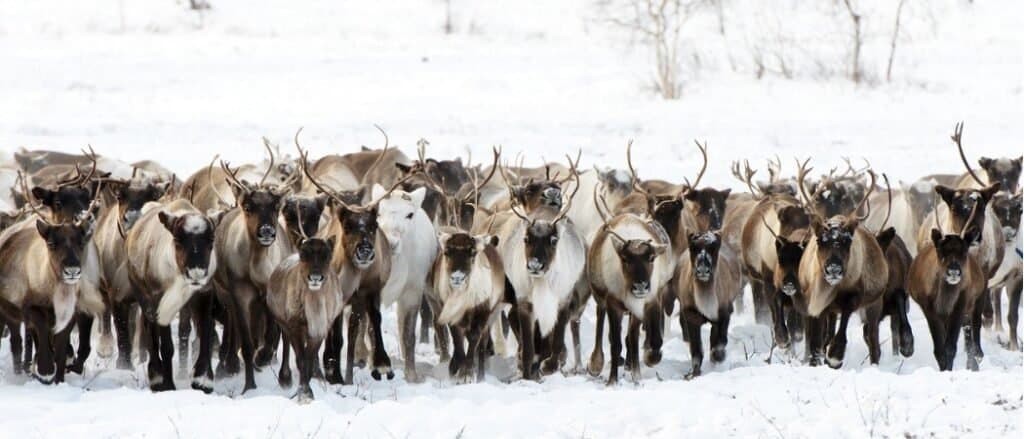
Caribou have many colors like brown, tan, and white in their fur, but moose are all brown
©longtaildog/Shutterstock.com
Moose are dark brown with gray in their fur as they get older. Caribou come in many colors including gray, brown, tan, and white. Caribou are much lighter in color than moose, and they have different colors throughout their fur. However, moose’s fur is very uniform when they are young, but gray starts to work its way into the fur, though never becoming the dominant color, as they age.
Caribou vs Moose: Location
Caribou, also known as reindeer, live in some of the coldest, northernmost regions of the world including Alaska, Canada, Russia, and Greenland. These animals migrate vast distances throughout the year to go to warmer areas and to reproduce.
Moose share many of the same areas as caribou, including Alaska, Canada, and northern parts of Europe and Asia. They also live in the lower 48 states of the United States of America. Also, they do not migrate the same vast distances as caribou because they do not venture as far north.
Although both creatures live in boreal forests and arctic tundra, caribou can be found in areas that are far north of moose herds or in places where moose do not live, like Greenland.
Caribou vs Moose: Danger to Humans
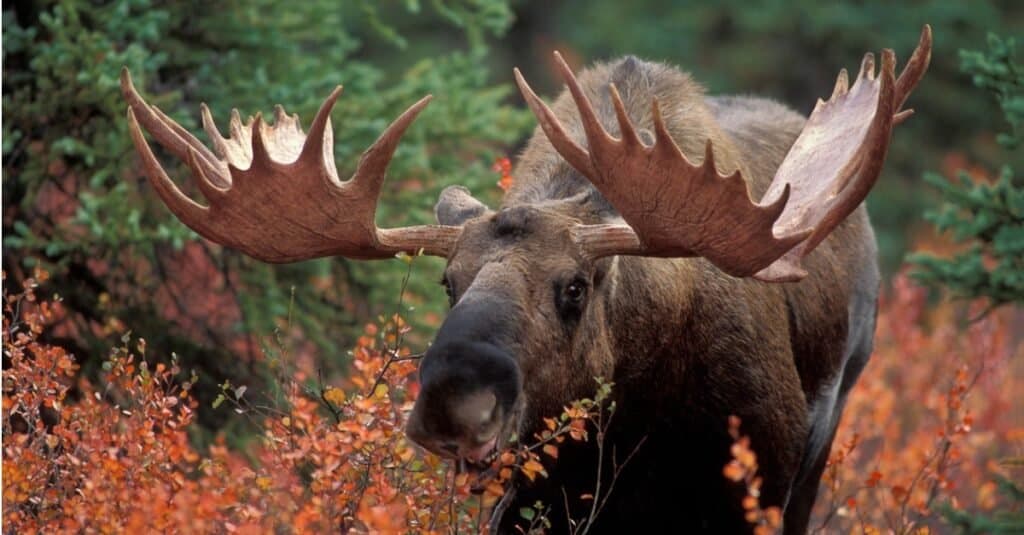
Moose wander into roads and cause car accidents every year, but caribou avoid humans
©iStock.com/RONSAN4D
Caribou rarely pose a danger to human beings since they live in remote areas and lack the territoriality of the moose. Moose pose a threat to humans that get too close to them and their young.
The most significant danger that moose pose to humans is actually car accidents. Dozens of people are injured every year in collisions with moose because they tend to live in remote areas that have more roads running through them than ever before. Although fatalities are rare, injuries are common!
Caribou and moose are very unique animals that need to be treated with respect and kept at a distance. Moose are larger than caribou, have unique antlers, and only come in one color. With that information along with the other data that we’ve discussed throughout this article, telling one from the other should be no problem!
The photo featured at the top of this post is © doliux/Shutterstock.com
Thank you for reading! Have some feedback for us? Contact the AZ Animals editorial team.




